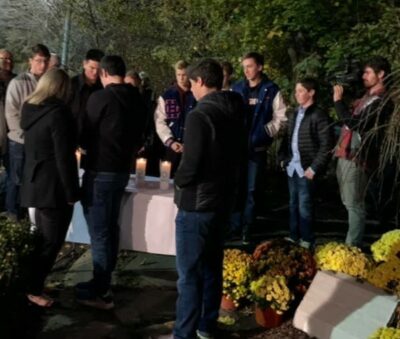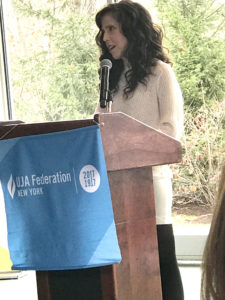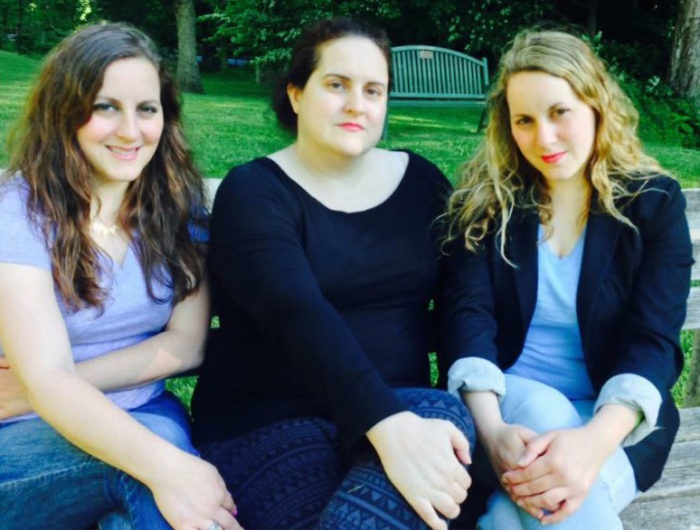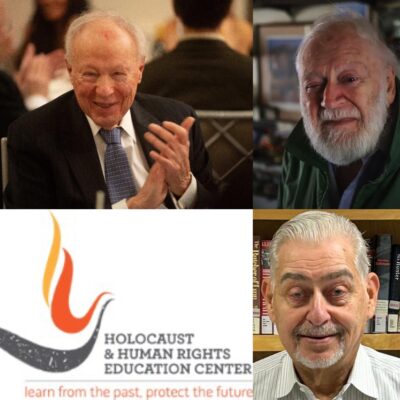
The Holocaust & Human Rights Education Center (HHREC) of White Plains, NY has announced three Holocaust Survivors have joined their Speakers Bureau.
Dr. Victor Borden (lower right above) is the son of Holocaust survivors Rywen (Roman) and Mina Bornsztajin (Bronstein), who were born and raised in Lodz, Poland from prosperous families. Victor tells the chilling story of his parents’ journey that started in Poland, as they survived imprisonment in the Soviet Union and eventually immigrated to America, where their son enlisted in the U.S. Air Force and served as a physician.
Ernest “Ernie” Brod (upper left) is a Holocaust Survivor who was born in Vienna, Austria in 1938. As a young boy he had to confront the grim realities of his father being among the first Jews killed in the early days of the Holocaust and seeing his brother sent off on a Kindertransport to England. A series of near miracles saved him and his mother from serving time in a concentration camp, and they made their way to Lisbon, Portugal before they finally immigrated to America in 1941. Ernie tells the story of how he and his family struggled to survive and eventually resettle in Brighton Beach, Brooklyn where he met his brother for the first time. A lawyer by training, he has spent the past 40 years as a corporate investigator and has been widely recognized as a leading expert in the field.
Charles Srebnik (upper right) is a Holocaust Survivor who was born in Brussels, Belgium in 1934 to Maria and Leon Srebnik. On May 10, 1940 German forces invaded Belgium, and by October the occupying military government began instituting anti-Jewish measures. His family went into hiding to escape the German onslaught by living at a cottage overlooking a lake near Genval.
Charles shares his story of being saved by a Catholic priest by hiding in orphanages to survive and eventually immigrating with his mother to America.
“We are very pleased to have such distinguished Holocaust Survivors who are witnesses to history join our Speakers Bureau and share their experiences with area high school and college students, and people who gather in our local communities.” said Millie Jasper, Executive Director, HHREC. “here stories will endure as they are of historical significance, and we need to hear them today more than ever.“
For more information about the HHREC Speakers Bureau, and to schedule an appearance at area schools, synagogues, churches and civic centers visit HHRECNY.org
About The Holocaust & Human Rights Education Center
The Holocaust & Human Rights Education Center (HHREC) is a 501(c)(3) nonprofit organization based in White Plains New York that serves schools, synagogues, colleges, churches and civic centers in Westchester and the greater Hudson Valley area. The HHREC Mission is to enhance the teaching and learning of the lessons of the Holocaust and the right of all people to be treated with dignity and respect. HHREC works with teachers and students to help schools fulfill the New York State mandate that the Holocaust and other human rights abuses be included in their curriculum. Since 1994, the HHREC has brought the lessons of the Holocaust, genocide and human rights violations to more than 3,000 teachers, and through them to thousands of students. For more information visit www.hhrecny.org call 914.696.0738 email info@hhrecny.org
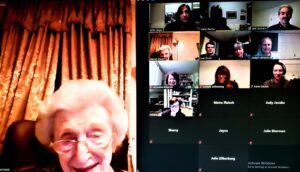
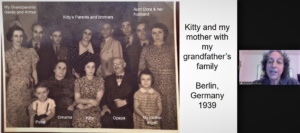
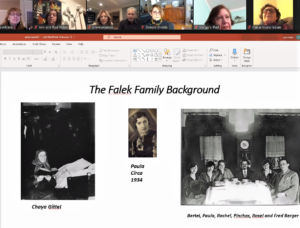
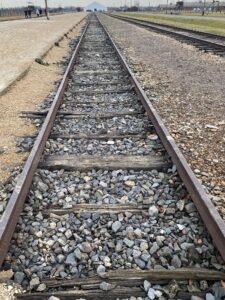
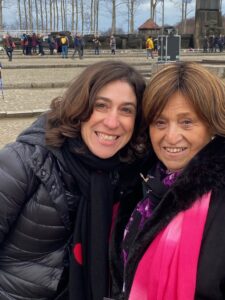
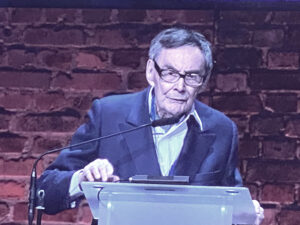
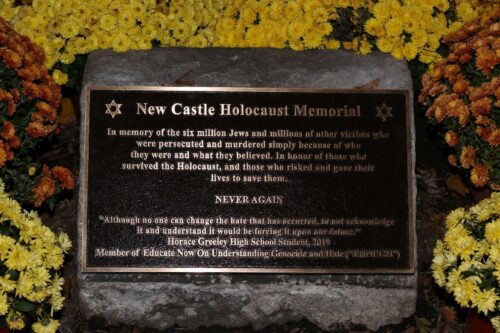
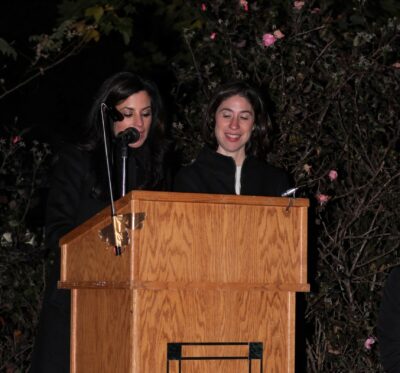 Ali began to focus her efforts on making an impact on the community and the schools. She wanted to find a way to increase Holocaust education for the next generation so that they could feel empowered to prevent this from ever happening again.
Ali began to focus her efforts on making an impact on the community and the schools. She wanted to find a way to increase Holocaust education for the next generation so that they could feel empowered to prevent this from ever happening again.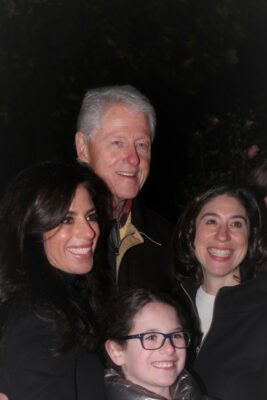
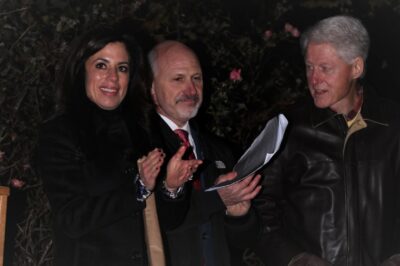
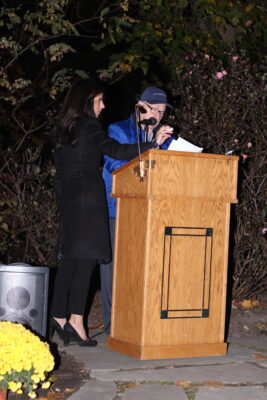
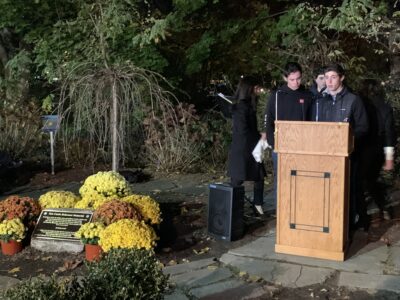
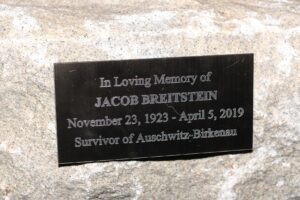 Holocaust survivor Peter Somogyi offered the keynote address which conveyed the pain and horror he endured as a victim of Dr. Mengele’s cruel experiments. A candle lighting ceremony was led by survivors and also by students of E.N.O.U.G.H.
Holocaust survivor Peter Somogyi offered the keynote address which conveyed the pain and horror he endured as a victim of Dr. Mengele’s cruel experiments. A candle lighting ceremony was led by survivors and also by students of E.N.O.U.G.H.